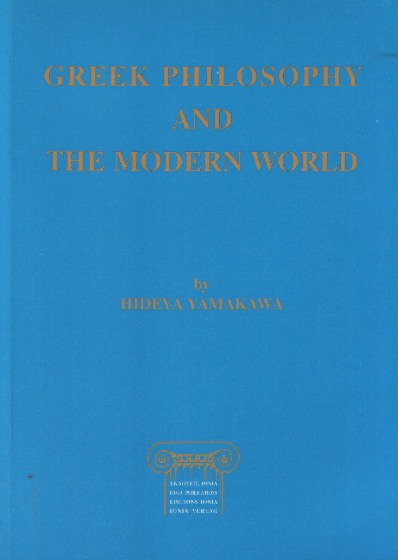
This volume includes eight studies on Greek philosophy that have been selected from papers of mine which bear some significant relation to the different topics of the modern world. After the model of Odysseus Elytis, I intended to create "a small yet a great world"( o Î?ÛÌÔ˜, o ÌÈÎÚ?˜, o ̤Á·˜), stretching my right arm to the Greek world and my left arm to the modern world, "A point A point" (EÓ· ÛËÌeiÔ . EÓ· ÛËÌÂiÔ). The title of this volume, according to my intention, symbolizes a scale (??Á?˜) balancing on such polarized interests.
Starting my career as a student specializing in the field of Plato's dialogues, from 1962 to the present, I have written a considerable number of articles on Plato's ontological and epistemological thought, most of which were published in Japanese . However, in this volume, except for only one small paper, i. e., "On the Notion of Participation in Plato's Theory of Forms", I have excluded all my studies on Plato and Socrates.The other studies concentrate mainly on logic and metaphysics in Presocratic and later Greek philosophy.
It seems to me that philosophical thinking in Europe originally resulted from the observation of "shadow," gradually proceeded to a direction, to the suppressing and erasing of the shadow. Was it not true that the celebration of reason that is indigenous to the European way of thinking could be actualized only through a painful compensation for the systematic distortion of the irrational aspects of human affairs? European metaphysics came into existence from the observation of the "shadow." Thales, the paradigmatic example of the European way of thinking, gazed at the shadow as a kind of projective "sign" as it is called in projection- geometry. And, indeed, reason came into existence by means of the gaze upon the shadows. Not only this, even the scientific representation of the world-order itself originated in the observation of shadows.

| Preface | 9 | |
| 1. | Meditation on Philosophy | 13 |
| 1. | Heraclitus and Chuang-tzu : A Dialogue on the Unity of Opposites between East and West | 27 |
| 3. | Reductio ad absurdum | 53 |
| 4. | The Mathematical Structure of Zeno's Paradoxes of Motion | 73 |
| 5. | Henri Bergson and Zeno of Elea | 87 |
| 6. | Natural and Non-Natural Aspects of Modern Medical Practices from the Hippocratic and Traditional Greek Viewpoint | 109 |
| 7. | On the Notion of Participation in Plato's Theory of Forms | 121 |
| 8. | Aristotle's Theory of Justice and the Modern World | 133 |
| Selected Bibliography | 173 | |
| General Index | 178 | |
| Index of Greek Words | 182 |